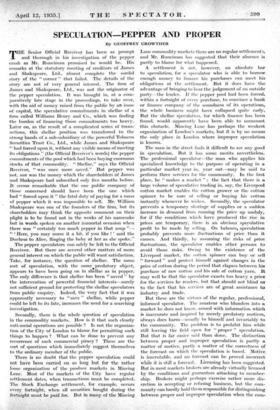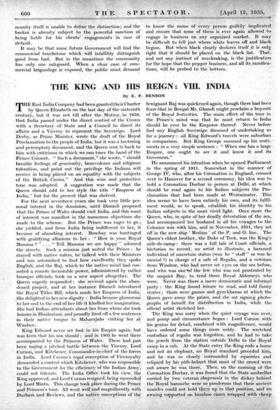SPECULATION-PEPPER AND PROPER
By GEOFFREY CROWTHER
THE Senior Official Receiver has been as prompt and thorough in his investigation of the pepper crash as Mr. Runcirnan promised he would be. His remarks at the statutory meeting of creditors of James and Shakspeare, Ltd., almost complete the sordid story of the " corner' that failed. The details of the story are not of very general interest. , The firm of James and Sfiakspeare,. Ltd., was not the originator of the pepper speculation. It was brought in, at a com- paratively late stage in the proceedings, to take over, with the aid of money raised from the public by an issue of capital, the speculative commitments in shellac of a firm called Williams Henry and Co., which was finding the burden of financing those commitments too heavy. Later on, as the result of a complicated series of trans- actions, this shellac position was transferred to the strong hands of a sub-subsidiary of the powerful Tobacco Securitie,s Trust Co., Ltd., while James and Shakspeare " had forced upon it, without any visible means of meeting its obligations " (the Official Receiver's words) the pepper commitments of the pool which had been buying enormous Stocks of that commodity. " Shellac," says the Official Receiver, " was once more saved." But pepper was not, nor was the money which the shareholders of James and Shakspeare had subscribed only five months before. It seems remarkable that the one public company of those concerned should have been the one which had " forced upon it " the fatal duty of paying for a mass of pepper which it was impossible to sell. Mr. William Shakspeare was one of the founders of the firm, but its shareholders may think the apposite comment on their plight is to be found' not in the works of his namesake but in words spoken on another immortal occasion when there was " certainly too much pepper in that soup "- "'Here, you may nurse it a bit, if you' like ! ' said the Duchess to Alice, flinging the baby at her as she spoke."
The pepper speculators can safely be left to the Official Receiver. But there are several other matters of more general interest on which the public will want satisfaction. Take, for instance, the question of shellac. The same sort of speculation, with the same. predatory object, appears to have been going on in shellac as in pepper. The only difference is that shellac has been " saved " by the intervention of powerful financial interests—surely not sufficient ground for protecting the shellac speculators from public enquiry. Indeed, the very fact that it was apparently necessary to "save " shellac, while pepper could be left to its fate, increases the need for a searching investigation.
Secondly, there is the whole question of speculation in the-commodity markets. How is it that such clearly anti-social operations are possible ? Is not the organiza- tion of the City of London to blaMe for permitting such things to happen ? What can be done to prevent any recurrence of such commercial piracy ? These are the sort of questions which immediately suggest themselves to the ordinary member of the public.
There is no doubt that the pepper speculation could not have been carried on so long but for the rather loose organization of the produce markets in Mincing Lane. Most of the markets of the City _have regular settlement dates, when transactions must be completed. The Stock Exchange settlement, for example, occurs every fortnight, when all securities bought during the fortnight must be paid for. But in many of the Mincing Lane commodity markets there are no regular settlement3, and Mr. Runciman has suggested that their absence is partly to blame for what happened.
A settlement is not, however, an absolute bar to speculation, for a speculator who is able to borrow enough money to finance his purchases can meet his obligations at the settlement. But it does have the advantage of bringing to bear the judgement of an outside party—the lender. If the pepper pool had been forced, within a fortnight of every purchase, to convince a bank or fmance company of the soundness of its operations, the whole business might have collapsed quite early. But the shellac speculation, for which finance has been found, would apparently have been able to surmount this obstacle. Mincing Lane has perhaps the weakest organization of London's markets, but it is by no means the only place in London where improper speculation is known.
The man in the street finds it difficult to see any good in speculation. But it has some merits nevertheless. The professional speculator—the man who applies his specialized knowledge to the purpose of operating in a particular market year in, year. out—may be said to perform three services for the community. In the first place, he " makes a market " : the fact that there is a large volume of speculative trading in, say, the Liverpool cotton market enables the cotton grower or the cotton spinner to be sure of selling or buying his cotton instantly whenever he wishes. Secondly, the speculator prevents a temporary shortage of supplies or a sudden increase in demand from running the price up unduly? for if the conditions which have produced the rise in prices are temporary, there is an obvious speculative profit to be made by selling. On balance, speculation probably prevents more fluctuations of price than it causes. And thirdly, by assuming the risks, of price fluctuations, the speculator enables other persons to avoid those risks. Owing to the existence of the Liverpool market, the cotton spinner can buy or sell " forward " and protect himself against changes in the price of cotton during the period that elapses between his purchase of raw cotton and his sale of cotton yarn. It may well be that the speculator exacts too heavy a price for the services he renders, but that should not blind us to the fact that his services are of great assistance to industry and trade.
But these are the virtues of the regular, professional, informed speculator. The amateur who blunders into a market he does not know, armed with information which is inaccurate and inspired by merely predatory motives, always does harm—usually to himself and invariably to the community. The problem is to prohibit him while still leaving the field open for " proper. " speculation. But that is far easier said than done. The distinction between proper and improper speculation is partly a matter of motive, partly a matter of the correctness of the forecast on which the speculation is based. Motive is inscrutable, and no forecast can be proved incorrect while it is still a forecast. Licensing has been suggested. But in most markets brokers are already virtually licensed by the conditions and guarantees attaching to member- ship. Brokers might perhaps exercise rather more dis- cretion in accepting or refusing business, but the com- munity can hardly hold them responsible for distinguishing between proper and improper speculation when the atm- munity itself is unable to define the distinction; and the broker is already subject to the powerful sanction of being liable for his clients' engagements in case of default.
It may be that some future Government will find the commercial touchstone which will infallibly distinguish good from bad. But in the meantime the community has- only one safeguard. When a clear case of corn: -mercial brigandage is' exposed, the public must demand to know the name of every person guiltily implicated and ensure that none of them is ever again allowed to engage in business on any organized market. It may be difficult to tell just where white leaves off and black begins. But when black clearly declares itself it is only right that it should be placed on the black list. That; and not any instinct of muckraking, is the justification for the hope that the pepper business, and all its ramifica- tions, will be probed to the bottom.



















































 Previous page
Previous page